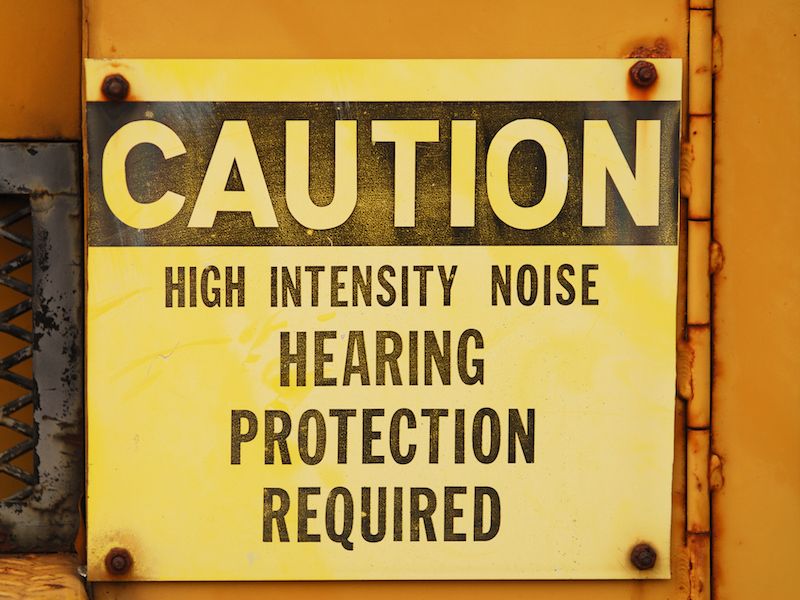
Understanding you should protect your ears is one thing. Knowing when to protect your ears is a different story. It’s harder than, for instance, knowing when you need sunblock. (Is the sun out and will you be outside? Then you need sunscreen.) Even recognizing when you need eye protection is simpler (Using a hammer? Cutting some wood or working with dangerous chemicals? Use eye protection).
With regards to when to use hearing protection, there seems to be a large grey area which can be dangerous. Frequently, we’ll defer to our natural inclination to avoid hearing protection unless we have information that a particular place or activity is hazardous.
A Tale of Risk Analysis
In general, we’re not very good at assessing risk, especially when it comes to something as intangible as permanent hearing damage or loss of hearing. To prove the point, here are some examples:
- A very loud rock concert is attended by person A. 3 hours is around how long the concert lasts.
- A landscaping business is run by person B. After mowing lawns all day, she goes home and quietly reads a book.
- Person C works in an office.
You might think that person A (let’s call her Ann, to be a little less clinical) might be in more hearing danger. For most of the next day, her ears will still be ringing from the loud concert. It seems fair to presume that Ann’s activity was quite risky.
The noise that person B (let’s just call her Betty), is subjected to is not as loud. Her ears don’t ring. So her hearing must be safer, right? Well, not quite. Because Betty is mowing all day. Actually, the damage accumulates a little at a time despite the fact that they don’t ring out. If experienced every day, even moderately loud noises can have a harmful affect on your ears.
What’s happening with person C (let’s call her Chris) is even harder to sort out. The majority of individuals understand that you should protect your ears while using machines such as a lawnmower. But while Chris works in a quiet office, she has a really noisy, hour-long commute each day through the city. In addition, she sits behind her desk and listens to music through earbuds. Does she need to think about protection?
When is it Time to Start to Think About Protecting Your Hearing?
Normally, you should turn down the volume if you have to shout to be heard. And if your surroundings are that noisy, you should think about using earmuffs or earplugs.
So to put this a bit more scientifically, you need to use 85dB as your limit. Noises above 85dB have the potential to cause injury over time, so in those situation, you need to think about wearing hearing protection.
Most hearing professionals suggest using a specialized app to keep track of decibel levels so you will be cognizant of when the 85dB has been reached. You will be capable of taking the correct steps to protect your ears because these apps will inform you when the noise is getting to a harmful level.
A Few Examples
Even if you do download that app and take it with you, your phone may not be with you everywhere you go. So we might establish a good standard with a couple of examples of when to protect our ears. Here we go:
- Listening to music with earbuds. OK, this doesn’t call for protection but does require care. Whether your music is going directly into your ears, how loud it’s playing, and how long you’re listening to it are all things you should pay attention to. Consider using headphones that cancel out outside sound so you don’t need to turn up the volume to hazardous levels.
- Using Power Tools: You know you will need hearing protection if you work every day in a factory. But how about the enthusiast building in his garage? Even if it’s only a hobby, hearing specialists suggest using hearing protection if you’re utilizing power equipment.
- Every day Chores: Even mowing the lawn, as previously explained, calls for hearing protection. Chores, like mowing, are most likely something you don’t even think about, but they can lead to hearing damage.
- Driving & Commuting: Driving all day as an Uber or Lyft driver? Or perhaps you’re riding the subway after waiting for a while downtown. The noise of living in the city is bad enough for your hearing, not to mention the added injury caused by cranking up your music to drown out the city noise.
- Exercise: You know your morning cycling class? Or maybe your daily elliptical session. All of these examples might require ear protection. The loud volume from trainers who use loud music and microphones for motivation, though it might be good for your heart rate, can be bad for your ears.
These illustrations might give you a suitable baseline. If there is any doubt, though, wear protection. In the majority of cases, it’s better to over-protect your hearing than to leave them subject to possible injury in the future. Protect today, hear tomorrow.
